School of Dentistry

TOPSchool of Dentistry
Message from School of Dentistry Chairperson
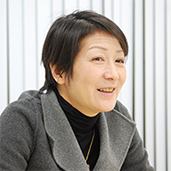
The School of Dentistry at Institute of Science Tokyo provides high-quality education ranging from fundamental to clinical dentistry, reflecting its status as a front-runner among dental training institutions.
The curriculum has been reformed in response to global trends, starting with students enrolled in 2023. Specialized education has been prioritized, allowing students to engage with various fields of dentistry at an earlier stage. Additionally, in response to an aging society and the complexities of modern medical care, Science Tokyo has developed its integrated medical and dental education program to promote cooperation among multiple professions. While sharing medical knowledge, students will understand the importance of teamwork in clinical practice, and study how to develop it. Moreover, to further cultivate our clinician-scientists, Science Tokyo offers introductory courses for pre-clinical students to experience and understand research methods before engaging with cutting-edge material in the practical training courses.
While forming this new curriculum, we are also maintaining good traditions. Fifth- and sixth-year students will continue to acquire the skills and mindset of a dentist through comprehensive clinical practice, being in charge of their patients for almost a year. At the same time, Science Tokyo actively promotes international-minded education, including overseas training through its global partner university network. For pre-clinical students, study abroad programs focused on cultural exchange are offered to enhance awareness of Japan's role in Asia. For senior students, clinical site visits and dispatches are conducted to give them the opportunity to put their research into practice and think about their career paths.
Throughout the six-year program, Science Tokyo aims to nurture leaders in the dental field who will play an active role both in Japan and overseas, not only by teaching them specialized knowledge and skills, but also by fostering a rich humanity and a strong sense of mission.
Chair, School of Dentistry
ISEKI Sachiko
Education
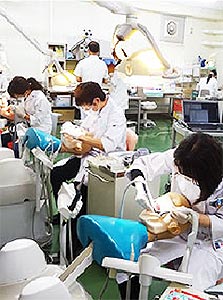
The School of Dentistry was established in 1928 and since that time it has actively contributed to the development of dental medicine in Japan. Our aim is to train global leaders who can develop cutting-edge modern dental care in our highly globalized and aging society. Our graduates are trained to become not only dentists and creative researchers capable of solving problems that are presented to them, but also global leaders in dentistry who possess a sense of humanity and mission. In order to provide our students with the highest education level possible, we are constantly working on improving our educational program by observing the successful examples of educational programs run by various domestic and overseas universities and modifying our present curriculum to meet the accreditation standards for dental education.
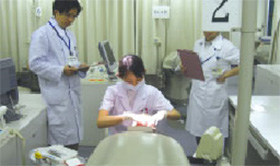
Our main goal is to educate well-trained dental care professionals. In our well-equipped dental hospital, students are trained by experienced staff and get first-hand experience of comprehensive patient care. At the time of graduation, they possess excellent technical skills and are fully prepared to give dental care of the highest quality.
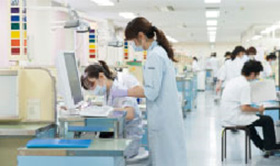
Taking advantage of being one of the largest dental research institutions in Japan, at which top-level research is conducted, we put effort into training the next generation of leading-researchers. Our students have an opportunity to participate in various practical courses including a long-term Research Project course and Clinical Practicum for Comprehensive Patient Care to develop their science processing skills.
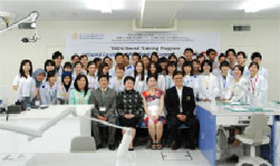
Our school has affiliations with more than 50 overseas universities and runs a number of international programs. Every year, selected undergraduate students are awarded the TMDU scholarship and can spend several weeks in top-class medical and dental institutions overseas. At the same time, we also accept foreign dental students in both short-term externship and Ph.D. programs. By creating such an international environment, we give our undergraduate students an opportunity to broaden their horizons to meet the demands of a globalizing world.
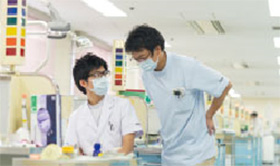
Our goal is to educate dental "professionals with knowledge and humanity". Therefore, our graduates are expected to be creative future leaders, who combine their broad education, outstanding dental skills, and high ethical standards to provide comprehensive care to our patients.
Curriculum of Course School of Dentistry
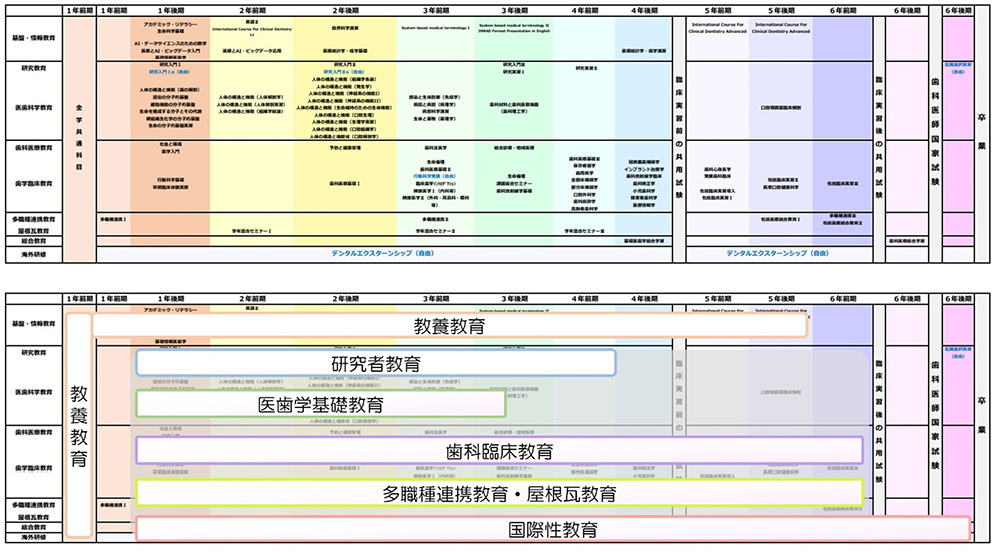
International Exchange
Thai Short-Term International Exchange Face-to-Face and via the Internet
Harada Kentaro
4th year Student, School of Dentistry
Study program in Thailand.
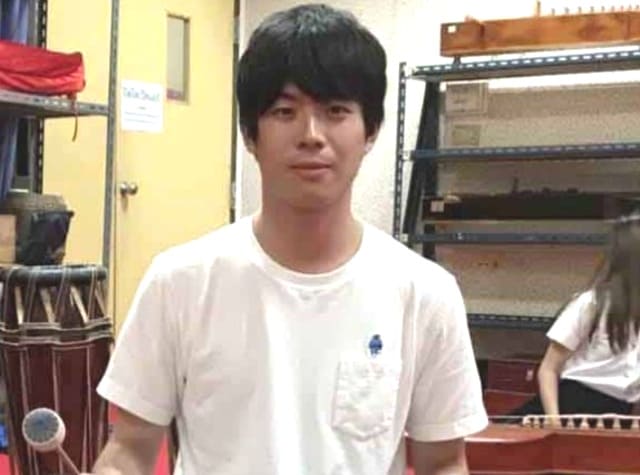
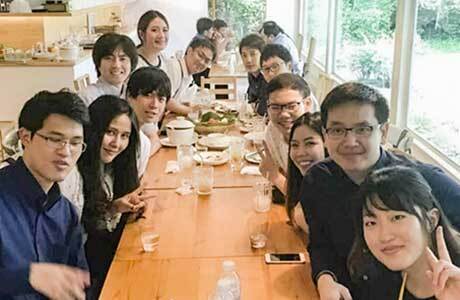
In 2018, when I was in my second year, I went to the Faculty of
Dentistry, Srinakharinwirot University (SWU), Bangkok, Thailand. It
was only a two-week, short-term study program, but I gained an
overview of the facilities at the Faculty of Dentistry, the dentists,
the dental education curriculum, and so forth. In addition to the
direct insights I obtained from this program, I learned about Thai
culture, the atmosphere, and the Thai lifestyle. The teachers and
students at the university were keen to discuss issues during
lectures and when having lunch together. Those times deepened
my knowledge of the pros and cons of the Thai dental educational
programs, healthcare system, and insurance. I also broadened
my perspectives on the geographical and epidemiological
situation not only related to oral health but also in other healthcare
fields, which are also affected by the socioeconomic conditions
and the religious and political situations.
This was the first time for me to visit another country to study
as a dental student, so everything was fresh and inspiring. Before
studying abroad, I had never thought deeply about our dental
education, oral health status, and oral health problems, but
visiting Thailand led me to gain greater insight into dentistry in
Japan by comparison.
Lunch time with Faculty
Playing Thai traditional musical instrument
The many friends and connections made during this study
program were indescribably precious, expanded my future vison
and mission, and promoted my international exchange with
students and teachers in other countries.
One of the events this experience motivated me to participate
in was the “Discussion Café with SWU and Tokyo Medical
and Dental University (TMDU)” in 2020. Since COVID-19, it
has become harder for those hoping to study abroad to visit
other countries and to engage in international exchange. The
experience in 2018 prompted me to continue on-line international
exchange as one of the Discussion Café’s task force members.
We prepared for the Discussion Café sufficiently to enable
students to take part in international exchange, including new first
year students. The good news was that as many as 45 SWU and
TMDU students joined the on-line Discussion Café. We mainly
discussed two topics related to the changing situations under
the pandemic. The topics were: changes in dental medicine/
practice during and after COVID-19 and our school life after 2020.
The discussions revealed that even under each country’s difficult
pandemic situation, many students and universities were seeking
solutions to enable students to study as usual and continue their
enthusiasm for studying dentistry and international exchange.
TMDU Annual News vol.13
Invaluable Experience in Boston
NAKAYAMA Mio
4th year Student, School of Dentistry
Study program in the U.S.
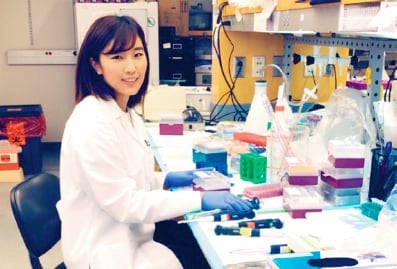
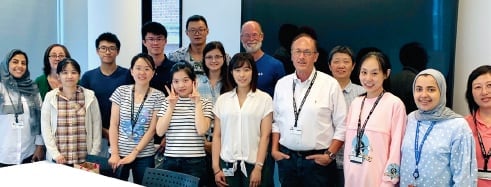
I PARTICIPATED IN basic research activities for three months at Harvard School of Dental
Medicine. I visited Dr.
Baron's laboratory, which was famous for bone research. During my stay, I was invited to join
my supervisor's
project (a postdoctoral student from China) exploring the influence of high circulating Irisin
on bone and
osteocytes.
Irisin is a newly identified myokine produced by skeletal muscles during physical exercise,
suggesting an
important role in bone remodeling.
At the beginning, I read many papers, including those published in Japan by Dr. Baron, in
order to prepare myself
for this project. I discussed what I couldn't understand with my supervisor.
While reading papers, I learned an clinexperiment technique needed for the project. Though I
had learned some
techniques in Japan, at Harvard I encountered difficulties learning unfamiliar protocols and
new, challenging
techniques.
I found euthanizing mice to be particularly difficult. We had to dissect mice as fast as
possible to get fresh
samples, but the process was extremely time consuming. After much practice, I was able to do
it more quickly. My
first month was spent primarily acquiring knowledge and experimental technique.
y main project started the second month there. It was a collaboration with a researcher at
DANA-FARBER, a cancer
institute, where we euthanized mice and obtained bone material. Later we analyzed the mice in
our laboratory using
the new technique I learned. The Harvard laboratory experience was invaluable because it
provided opportunities to
learn about career paths from mentors and co-researchers and observe first-hand the
environment of a large
laboratory on a scope I had never seen in Japan.
It was also my first time to visit the U.S. I was surprised at the rich international
environment. In my
laboratory, Dr. Baron was from France, and other members came from other countries, such as
Italy, China, Saudi
Arabia and more. They all had different backgrounds.
I really enjoyed talking with them and learned much about their respective countries. As most
of them were doctors
or dentists, I could ask them about the medical environment and education for dental students
in their country.
Outside the laboratory, I had dinner and lunch with them. At the end of my stay, they held a
farewell party for
me, complete with cake, and kindly gave me a card wishing me the best. I had a great time
thanks to them.
I visited sightseeing place in Boston on my holidays. There were many famous places, for
example, Museum of Fine
Arts and Freedom trail. I usually went out with medical students from Taiwan in my
laboratory.
My experience in Boston was invaluable.
I am determined to make use of my experience there in my future career as a dentist.
TMDU Annual News vol.12
Our Short-term Study in Indonesia
ABE Kousuke
4th year student, School of Dentistry
Study Program in Indonesia
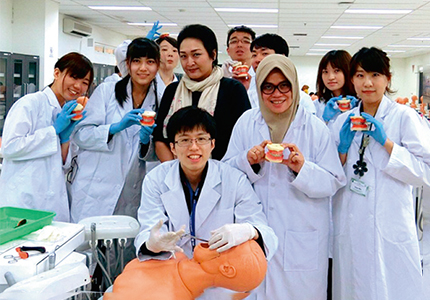
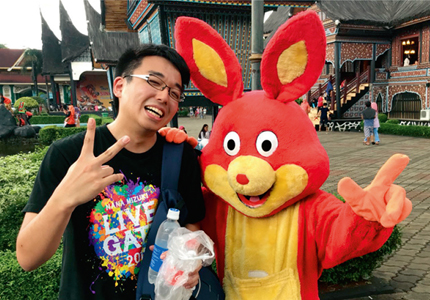
WE VISITED INDONESIA for eight days from March 4, 2018, for studentexchange activities between
the University of Indonesia (UI) and TMDU. I applied for this program as I had never been to
Southeast Asia and wanted to see a dental school in a foreign country to expand my knowledge.
We learned lots of things about dentistry and experienced Indonesia’s culture during this
overseas study.
At UI, we participated in a Prosthodontics and Oral Surgery Skills Lab, special lectures on
microbiology and dental materials and problem-based learning (PBL) for prosthodontics. UI
students take lectures on clinical dentistry from their first year. Unlike Japanese
universities, they do not seem to learn basic medicine. Therefore, although our grades were
different, they had already learned what we had only learned recently or have not yet learned
from lectures and practical training at TMDU, and so I was a bit confused.
However, I was able to make use of those lectures as preparation for clinical subjects in
TMDU.
Especially during PBL, I thought that the extent of their research and study was
extraordinary. Each student had a lot of information and participated in discussions. I
realized that the time they spend studying is overwhelmingly different from Japanese
university students.
We treated clinical content as the subject of PBL, and I realized that basic medicine was
still very important when studying clinical material. In fact, knowledge of immunology,
pathology and histology were very important.
Also, some people say that English education in Southeast Asia is not so advanced, but it is
superior to Japan. It was difficult to discuss the same topics in English, so I realized we
have to be exposed to English on a daily basis.
It was a great opportunity, and I was able to compare the strengths and weaknesses of
education at our university with the University of Indonesia. After graduating and acquiring
our licenses, we can compare ourselves again. That will be a wonderful stimulus for studying
hard, so I would like to try my best before comparing again.
We also gave presentations introducing life at TMDU and Japanese culture.
UI students gave presentations about UI and the culture of Indonesia in fluent English.
In addition, UI students guided us to a mosque, MONAS (National Monument) and Pari Island,
where we enjoyed cycling and snorkeling. We returned with a lot of precious memories.
This study program in Indonesia was a very good opportunity for me and I realized that I must
study hard about medicine moving forward.
TMDU Annual News vol.11
Clinical Education and Postgraduate Clinical Training
Dental Practice and Clinical Practicum for Comprehensive Patient Care
From their 5th to 6th year students see patients for almost one year at our student clinic. Through this experience they gain firsthand experience of comprehensive patient care from medical interview to maintenance of treatment under the guidance of seasoned instructors.
One-year Mandatory Postgraduate Clinical Training
In April 2006, one-year postgraduate clinical training became mandatory for newly licensed dentists. The TMDU Dental Hospital offers three programs for residents, not only to our graduates but also to graduates from other dental schools.
Advanced Postgraduate Clinical Training
The TMDU Dental Hospital offers a program of advanced postgraduate clinical training for residents who have completed the one-year mandatory postgraduate clinical training program. There are three courses: Specialty Course, Comprehensive Course and Specialty-Comprehensive Course.

